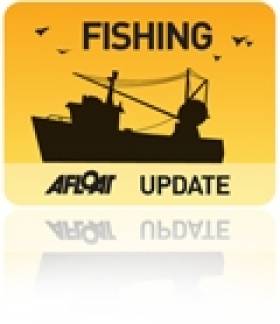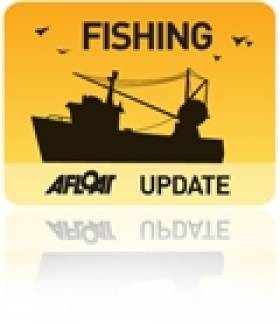Displaying items by tag: haddock
Fishing Industry Welcomes Selective Nets, Grant Aid at Irish Skipper Expo
#FISHING - Minister for the Marine Simon Coveney briefed the Irish Skipper Expo in Galway last weekend on a new initiative promoting the use of selective conservation fishing nets, which allow young fish to escape.
Under the initiative in the Celtic Sea, additional quotas of up to 25% will be made available by the minister to skippers of Irish fishing boats which use an escape panel in their nets, allowing young whiting and haddock to escape.
The escape panel, developed by the Irish industry, has been endorsed at EU level and is expected to be a mandatory requirement later in the year.
Minister Coveney said on Saturday: “The use of this panel will significantly reduce discards of juvenile whiting and haddock in the Celtic Sea, allowing juvenile fish to grow and mature and contribute to increased stock size and returns for fishermen in future years.
"I believe that this offers an example of a practical approach to dealing effectively with the discards problem and retention of a flexible quota allocation system that we should take forward in the context of the Common Fisheries Policy Review."
In other news, Bord Iascaigh Mhara (BIM) announced €1.5 million in grant aid for the Irish fishing industry at the expo.
A spokesperson for BIM confirmed to the Galway Independent that the funding will be available to industry through a variety of schemes including fleet safety, seafood environmental management, lobster V-notching and coastal action groups.
Over 100 companies displayed their products and services to fishermen at the Irish Skipper Expo International 2012, held at the Galway Bay Hotel on 24-25 February.
- Fishing
- commercial fishing
- Minister for the Marine
- Simon Coveney
- Irish Skipper Expo
- Skipper Expo International
- 2012
- Galway Bay Hotel
- Galway
- conservation
- selective
- quota
- Celtic sea
- initiative
- discards
- grant aid
- Bord Iascaigh Mhara
- BIM
- Funding
- Coastal
- Seafood
- whiting
- haddock
- juvenile fish
- Common Fisheries Policy
Cumbrians Urged to Try New Fish to Save Irish Sea Stocks
#FISHING - Seafood lovers of Cumbria in north-west England have been urged to broaden their tastes to save depleted stocks of their favourite fish in the Irish Sea.
According to the News & Star, some 80% of Britons "insist upon eating just five types of fish – cod, tuna, salmon, prawn and haddock."
But the Cumbria Wildlife Trust says that with coastal waters facing the serious threat of overfishing, a rethink is needed among both consumers and suppliers alike.
“The Irish Sea has a wide range of edible fish species but you wouldn’t know it judging by the fish counters in supermarkets across the county," says Lindsay Sullivan of the trust's Wild Oceans project, an 18-month scheme that hopes to "turn the tide for seafood".
A big part of this is encouraging consumers to skip the usual white fish and try different species such as flounder, monkfish and red mulllet, creating demand for cheaper and more sustainable fishing.
The News & Star has more on the story HERE.





























































